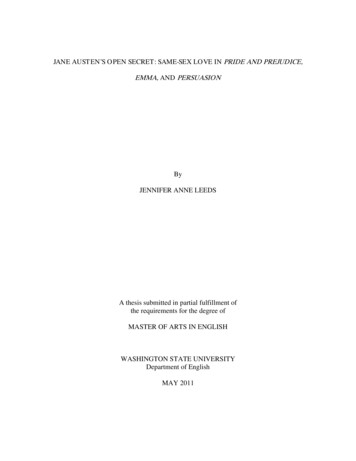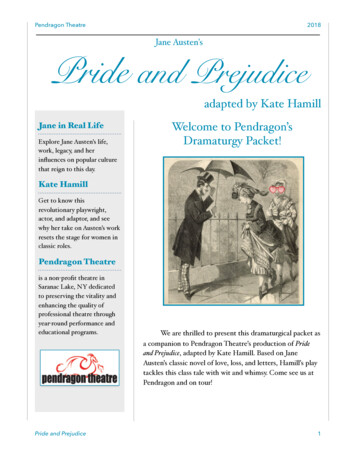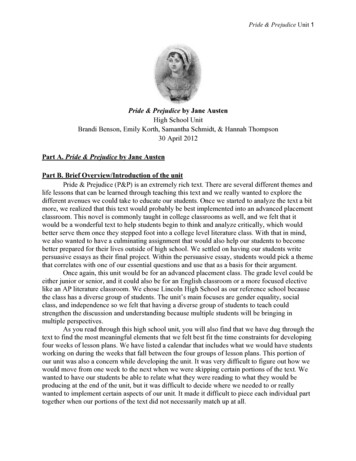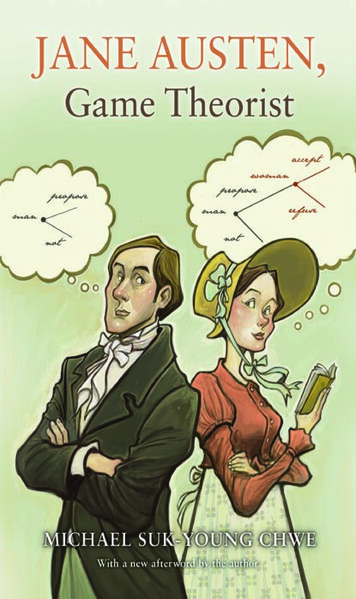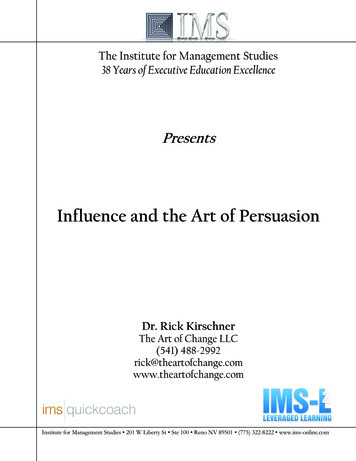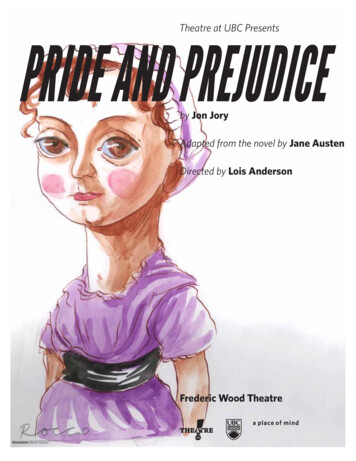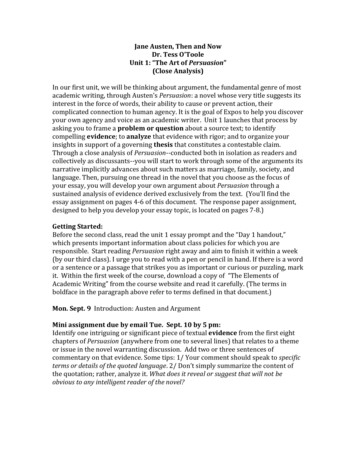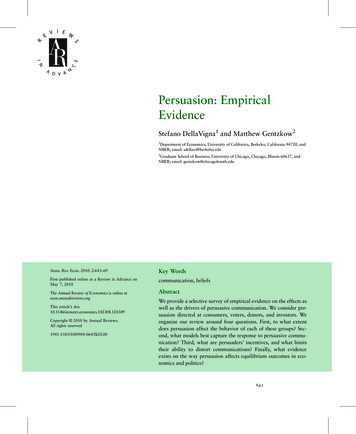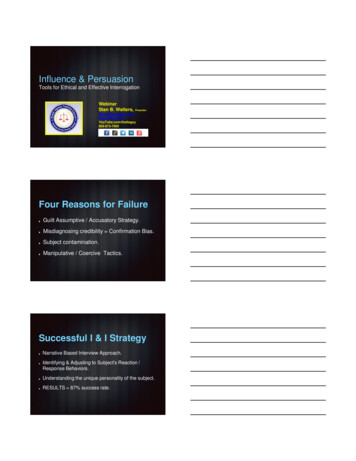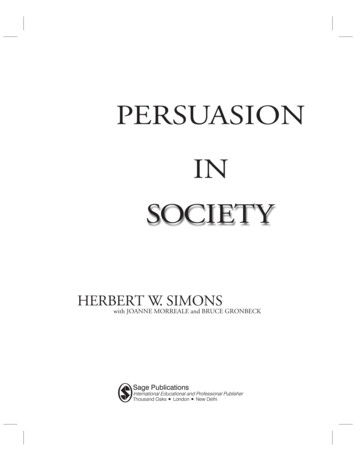
Transcription
www.freeclassicebooks.comPersuasionbyJane Austenwww.freeclassicebooks.com1
www.freeclassicebooks.comContentsChapter 1. 3Chapter 2. 8Chapter 3.12Chapter 4.17Chapter 5.21Chapter 6.27Chapter 7.34Chapter 8.40Chapter 9.46Chapter 10.52Chapter 11.59Chapter 12.65Chapter 13.75Chapter 14.80Chapter 15.85Chapter 16.91Chapter 17.96Chapter 18.103Chapter 19.111Chapter 20.116Chapter 21.123Chapter 22.135Chapter 23.146Chapter 24.1582
www.freeclassicebooks.comChapter 1 Sir Walter Elliot, of Kellynch Hall, in Somersetshire, was a manwho, for his own amusement, never took up any book but the Baronetage;there he found occupation for an idle hour, and consolation in a distressedone; there his faculties were roused into admiration and respect, bycontemplating the limited remnant of the earliest patents; there anyunwelcome sensations, arising from domestic affairs changed naturally intopity and contempt as he turned over the almost endless creations of the lastcentury; and there, if every other leaf were powerless, he could read his ownhistory with an interest which never failed. This was the page at which thefavourite volume always opened:"ELLIOT OF KELLYNCH HALL."Walter Elliot, born March 1, 1760, married, July 15, 1784, Elizabeth,daughter of James Stevenson, Esq. of South Park, in the county ofGloucester, by which lady (who died 1800) he has issue Elizabeth, bornJune 1, 1785; Anne, born August 9, 1787; a still-born son, November 5,1789; Mary, born November 20, 1791." Precisely such had the paragraphoriginally stood from the printer's hands; but Sir Walter had improved it byadding, for the information of himself and his family, these words, after thedate of Mary's birth-- "Married, December 16, 1810, Charles, son and heir ofCharles Musgrove, Esq. of Uppercross, in the county of Somerset," and byinserting most accurately the day of the month on which he had lost hiswife. Then followed the history and rise of the ancient and respectablefamily, in the usual terms; how it had been first settled in Cheshire; howmentioned in Dugdale, serving the office of high sheriff, representing aborough in three successive parliaments, exertions of loyalty, and dignity ofbaronet, in the first year of Charles II, with all the Marys and Elizabethsthey had married; forming altogether two handsome duodecimo pages, andconcluding with the arms and motto:--"Principal seat, Kellynch Hall, in thecounty of Somerset," and Sir Walter's handwriting again in this finale:-"Heir presumptive, William Walter Elliot, Esq., great grandson of the secondSir Walter." Vanity was the beginning and the end of Sir Walter Elliot'scharacter; vanity of person and of situation. He had been remarkablyhandsome in his youth; and, at fifty-four, was still a very fine man. Fewwomen could think more of their personal appearance than he did, norcould the valet of any new made lord be more delighted with the place heheld in society. He considered the blessing of beauty as inferior only to theblessing of a baronetcy; and the Sir Walter Elliot, who united these gifts,was the constant object of his warmest respect and devotion. His good looksand his rank had one fair claim on his attachment; since to them he musthave owed a wife of very superior character to any thing deserved by hisown. Lady Elliot had been an excellent woman, sensible and amiable;whose judgement and conduct, if they might be pardoned the youthfulinfatuation which made her Lady Elliot, had never required indulgenceafterwards.--She had humoured, or softened, or concealed his failings, and3
www.freeclassicebooks.compromoted his real respectability for seventeen years; and though not the veryhappiest being in the world herself, had found enough in her duties, herfriends, and her children, to attach her to life, and make it no matter ofindifference to her when she was called on to quit them.--Three girls, thetwo eldest sixteen and fourteen, was an awful legacy for a mother tobequeath, an awful charge rather, to confide to the authority and guidanceof a conceited, silly father. She had, however, one very intimate friend, asensible, deserving woman, who had been brought, by strong attachment toherself, to settle close by her, in the village of Kellynch; and on her kindnessand advice, Lady Elliot mainly relied for the best help and maintenance ofthe good principles and instruction which she had been anxiously giving herdaughters. This friend, and Sir Walter, did not marry, whatever might havebeen anticipated on that head by their acquaintance. Thirteen years hadpassed away since Lady Elliot's death, and they were still near neighboursand intimate friends, and one remained a widower, the other a widow. ThatLady Russell, of steady age and character, and extremely well provided for,should have no thought of a second marriage, needs no apology to thepublic, which is rather apt to be unreasonably discontented when a womandoes marry again, than when she does not; but Sir Walter's continuing insingleness requires explanation. Be it known then, that Sir Walter, like agood father, (having met with one or two private disappointments in veryunreasonable applications), prided himself on remaining single for his deardaughters' sake. For one daughter, his eldest, he would really have given upany thing, which he had not been very much tempted to do. Elizabeth hadsucceeded, at sixteen, to all that was possible, of her mother's rights andconsequence; and being very handsome, and very like himself, her influencehad always been great, and they had gone on together most happily. Histwo other children were of very inferior value. Mary had acquired a littleartificial importance, by becoming Mrs Charles Musgrove; but Anne, with anelegance of mind and sweetness of character, which must have placed herhigh with any people of real understanding, was nobody with either father orsister; her word had no weight, her convenience was always to give way--shewas only Anne. To Lady Russell, indeed, she was a most dear and highlyvalued god-daughter, favourite, and friend. Lady Russell loved them all; butit was only in Anne that she could fancy the mother to revive again. A fewyears before, Anne Elliot had been a very pretty girl, but her bloom hadvanished early; and as even in its height, her father had found little toadmire in her, (so totally different were her delicate features and mild darkeyes from his own), there could be nothing in them, now that she was fadedand thin, to excite his esteem. He had never indulged much hope, he hadnow none, of ever reading her name in any other page of his favourite work.All equality of alliance must rest with Elizabeth, for Mary had merelyconnected herself with an old country family of respectability and large4
www.freeclassicebooks.comfortune, and had therefore given all the honour and received none: Elizabethwould, one day or other, marry suitably. It sometimes happens that awoman is handsomer at twenty-nine than she was ten years before; and,generally speaking, if there has been neither ill health nor anxiety, it is atime of life at which scarcely any charm is lost. It was so with Elizabeth,still the same handsome Miss Elliot that she had begun to be thirteen yearsago, and Sir Walter might be excused, therefore, in forgetting her age, or, atleast, be deemed only half a fool, for thinking himself and Elizabeth asblooming as ever, amidst the wreck of the good looks of everybody else; forhe could plainly see how old all the rest of his family and acquaintance weregrowing. Anne haggard, Mary coarse, every face in the neighbourhoodworsting, and the rapid increase of the crow's foot about Lady Russell'stemples had long been a distress to him. Elizabeth did not quite equal herfather in personal contentment. Thirteen years had seen her mistress ofKellynch Hall, presiding and directing with a self-possession and decisionwhich could never have given the idea of her being younger than she was.For thirteen years had she been doing the honours, and laying down thedomestic law at home, and leading the way to the chaise and four, andwalking immediately after Lady Russell out of all the drawing-rooms anddining-rooms in the country. Thirteen winters' revolving frosts had seen heropening every ball of credit which a scanty neighbourhood afforded, andthirteen springs shewn their blossoms, as she travelled up to London withher father, for a few weeks' annual enjoyment of the great world. She hadthe remembrance of all this, she had the consciousness of being nine-andtwenty to give her some regrets and some apprehensions; she was fullysatisfied of being still quite as handsome as ever, but she felt her approachto the years of danger, and would have rejoiced to be certain of beingproperly solicited by baronet-blood within the next twelvemonth or two.Then might she again take up the book of books with as much enjoyment asin her early youth, but now she liked it not. Always to be presented with thedate of her own birth and see no marriage follow but that of a youngestsister, made the book an evil; and more than once, when her father had leftit open on the table near her, had she closed it, with averted eyes, andpushed it away. She had had a disappointment, moreover, which that book,and especially the history of her own family, must ever present theremembrance of. The heir presumptive, the very William Walter Elliot, Esq.,whose rights had been so generously supported by her father, haddisappointed her. She had, while a very young girl, as soon as she hadknown him to be, in the event of her having no brother, the future baronet,meant to marry him, and her father had always meant that she should. Hehad not been known to them as a boy; but soon after Lady Elliot's death, SirWalter had sought the acquaintance, and though his overtures had not beenmet with any warmth, he had persevered in seeking it, making allowance for5
www.freeclassicebooks.comthe modest drawing-back of youth; and, in one of their spring excursions toLondon, when Elizabeth was in her first bloom, Mr Elliot had been forcedinto the introduction. He was at that time a very young man, just engaged inthe study of the law; and Elizabeth found him extremely agreeable, andevery plan in his favour was confirmed. He was invited to Kellynch Hall; hewas talked of and expected all the rest of the year; but he never came. Thefollowing spring he was seen again in town, found equally agreeable, againencouraged, invited, and expected, and again he did not come; and the nexttidings were that he was married. Instead of pushing his fortune in the linemarked out for the heir of the house of Elliot, he had purchasedindependence by uniting himself to a rich woman of inferior birth. Sir Walterhas resented it. As the head of the house, he felt that he ought to have beenconsulted, especially after taking the young man so publicly by the hand;"For they must have been seen together," he observed, "once at Tattersall's,and twice in the lobby of the House of Commons." His disapprobation wasexpressed, but apparently very little regarded. Mr Elliot had attempted noapology, and shewn himself as unsolicitous of being longer noticed by thefamily, as Sir Walter considered him unworthy of it: all acquaintancebetween them had ceased. This very awkward history of Mr Elliot was still,after an interval of several years, felt with anger by Elizabeth, who had likedthe man for himself, and still more for being her father's heir, and whosestrong family pride could see only in him a proper match for Sir WalterElliot's eldest daughter. There was not a baronet from A to Z whom herfeelings could have so willingly acknowledged as an equal. Yet so miserablyhad he conducted himself, that though she was at this present time (thesummer of 1814) wearing black ribbons for his wife, she could not admithim to be worth thinking of again. The disgrace of his first marriage might,perhaps, as there was no reason to suppose it perpetuated by offspring,have been got over, had he not done worse; but he had, as by theaccustomary intervention of kind friends, they had been informed, spokenmost disrespectfully of them all, most slightingly and contemptuously of thevery blood he belonged to, and the honours which were hereafter to be hisown. This could not be pardoned. Such were Elizabeth Elliot's sentimentsand sensations; such the cares to alloy, the agitations to vary, the samenessand the elegance, the prosperity and the nothingness of her scene of life;such the feelings to give interest to a long, uneventful residence in onecountry circle, to fill the vacancies which there were no habits of utilityabroad, no talents or accomplishments for home, to occupy. But now,another occupation and solicitude of mind was beginning to be added tothese. Her father was growing distressed for money. She knew, that whenhe now took up the Baronetage, it was to drive the heavy bills of histradespeople, and the unwelcome hints of Mr Shepherd, his agent, from histhoughts. The Kellynch property was good, but not equal to Sir Walter's6
www.freeclassicebooks.comapprehension of the state required in its possessor. While Lady Elliot lived,there had been method, moderation, and economy, which had just kept himwithin his income; but with her had died all such right-mindedness, andfrom that period he had been constantly exceeding it. It had not beenpossible for him to spend less; he had done nothing but what Sir WalterElliot was imperiously called on to do; but blameless as he was, he was notonly growing dreadfully in debt, but was hearing of it so often, that itbecame vain to attempt concealing it longer, even partially, from hisdaughter. He had given her some hints of it the last spring in town; he hadgone so far even as to say, "Can we retrench? Does it occur to you thatthere is any one article in which we can retrench?" and Elizabeth, to do herjustice, had, in the first ardour of female alarm, set seriously to think whatcould be done, and had finally proposed these two branches of economy, tocut off some unnecessary charities, and to refrain from new furnishing thedrawing-room; to which expedients she afterwards added the happy thoughtof their taking no present down to Anne, as had been the usual yearlycustom. But these measures, however good in themselves, were insufficientfor the real extent of the evil, the whole of which Sir Walter found himselfobliged to confess to her soon afterwards. Elizabeth had nothing to proposeof deeper efficacy. She felt herself ill-used and unfortunate, as did herfather; and they were neither of them able to devise any means of lesseningtheir expenses without compromising their dignity, or relinquishing theircomforts in a way not to be borne. There was only a small part of his estatethat Sir Walter could dispose of; but had every acre been alienable, it wouldhave made no difference. He had condescended to mortgage as far as hehad the power, but he would never condescend to sell. No; he would neverdisgrace his name so far. The Kellynch estate should be transmitted wholeand entire, as he had received it. Their two confidential friends, MrShepherd, who lived in the neighbouring market town, and Lady Russell,were called to advise them; and both father and daughter seemed to expectthat something should be struck out by one or the other to remove theirembarrassments and reduce their expenditure, without involving the loss ofany indulgence of taste or pride.7
www.freeclassicebooks.comChapter 2 Mr Shepherd, a civil, cautious lawyer, who, whatever might behis hold or his views on Sir Walter, would rather have the disagreeableprompted by anybody else, excused himself from offering the slightest hint,and only begged leave to recommend an implicit reference to the excellentjudgement of Lady Russell, from whose known good sense he fully expectedto have just such resolute measures advised as he meant to see finallyadopted. Lady Russell was most anxiously zealous on the subject, and gaveit much serious consideration. She was a woman rather of sound than ofquick abilities, whose difficulties in coming to any decision in this instancewere great, from the opposition of two leading principles. She was of strictintegrity herself, with a delicate sense of honour; but she was as desirous ofsaving Sir Walter's feelings, as solicitous for the credit of the family, asaristocratic in her ideas of what was due to them, as anybody of sense andhonesty could well be. She was a benevolent, charitable, good woman, andcapable of strong attachments, most correct in her conduct, strict in hernotions of decorum, and with manners that were held a standard of goodbreeding. She had a cultivated mind, and was, generally speaking, rationaland consistent; but she had prejudices on the side of ancestry; she had avalue for rank and consequence, which blinded her a little to the faults ofthose who possessed them. Herself the widow of only a knight, she gave thedignity of a baronet all its due; and Sir Walter, independent of his claims asan old acquaintance, an attentive neighbour, an obliging landlord, thehusband of her very dear friend, the father of Anne and her sisters, was, asbeing Sir Walter, in her apprehension, entitled to a great deal of compassionand consideration under his present difficulties. They must retrench; thatdid not admit of a doubt. But she was very anxious to have it done with theleast possible pain to him and Elizabeth. She drew up plans of economy, shemade exact calculations, and she did what nobody else thought of doing:she consulted Anne, who never seemed considered by the others as havingany interest in the question. She consulted, and in a degree was influencedby her in marking out the scheme of retrenchment which was at lastsubmitted to Sir Walter. Every emendation of Anne's had been on the side ofhonesty against importance. She wanted more vigorous measures, a morecomplete reformation, a quicker release from debt, a much higher tone ofindifference for everything but justice and equity. "If we can persuade yourfather to all this," said Lady Russell, looking over her paper, "much may bedone. If he will adopt these regulations, in seven years he will be clear; andI hope we may be able to convince him and Elizabeth, that Kellynch Hall hasa respectability in itself which cannot be affected by these reductions; andthat the true dignity of Sir Walter Elliot will be very far from lessened in theeyes of sensible people, by acting like a man of principle. What will he be8
www.freeclassicebooks.comdoing, in fact, but what very many of our first families have done, or oughtto do? There will be nothing singular in his case; and it is singularity whichoften makes the worst part of our suffering, as it always does of ourconduct. I have great hope of prevailing. We must be serious and decided;for after all, the person who has contracted debts must pay them; andthough a great deal is due to the feelings of the gentleman, and the head of ahouse, like your father, there is still more due to the character of an honestman." This was the principle on which Anne wanted her father to beproceeding, his friends to be urging him. She considered it as an act ofindispensable duty to clear away the claims of creditors with all theexpedition which the most comprehensive retrenchments could secure, andsaw no dignity in anything short of it. She wanted it to be prescribed, andfelt as a duty. She rated Lady Russell's influence highly; and as to thesevere degree of self-denial which her own conscience prompted, shebelieved there might be little more difficulty in persuading them to acomplete, than to half a reformation. Her knowledge of her father andElizabeth inclined her to think that the sacrifice of one pair of horses wouldbe hardly less painful than of both, and so on, through the whole list of LadyRussell's too gentle reductions. How Anne's more rigid requisitions mighthave been taken is of little consequence. Lady Russell's had no success atall: could not be put up with, were not to be borne. "What! every comfort oflife knocked off! Journeys, London, servants, horses, table--contractions andrestrictions every where! To live no longer with the decencies even of aprivate gentleman! No, he would sooner quit Kellynch Hall at once, thanremain in it on such disgraceful terms." "Quit Kellynch Hall." The hint wasimmediately taken up by Mr Shepherd, whose interest was involved in thereality of Sir Walter's retrenching, and who was perfectly persuaded thatnothing would be done without a change of abode. "Since the idea had beenstarted in the very quarter which ought to dictate, he had no scruple," hesaid, "in confessing his judgement to be entirely on that side. It did notappear to him that Sir Walter could materially alter his style of living in ahouse which had such a character of hospitality and ancient dignity tosupport. In any other place Sir Walter might judge for himself; and wouldbe looked up to, as regulating the modes of life in whatever way he mightchoose to model his household." Sir Walter would quit Kellynch Hall; andafter a very few days more of doubt and indecision, the great question ofwhither he should go was settled, and the first outline of this importantchange made out. There had been three alternatives, London, Bath, oranother house in the country. All Anne's wishes had been for the latter. Asmall house in their own neighbourhood, where they might still have LadyRussell's society, still be near Mary, and still have the pleasure of sometimesseeing the lawns and groves of Kellynch, was the object of her ambition.But the usual fate of Anne attended her, in having something very opposite9
www.freeclassicebooks.comfrom her inclination fixed on. She disliked Bath, and did not think it agreedwith her; and Bath was to be her home. Sir Walter had at first thought moreof London; but Mr Shepherd felt that he could not be trusted in London, andhad been skilful enough to dissuade him from it, and make Bath preferred.It was a much safer place for a gentleman in his predicament: he mightthere be important at comparatively little expense. Two material advantagesof Bath over London had of course been given all their weight: its moreconvenient distance from Kellynch, only fifty miles, and Lady Russell'sspending some part of every winter there; and to the very great satisfactionof Lady Russell, whose first views on the projected change had been forBath, Sir Walter and Elizabeth were induced to believe that they should loseneither consequence nor enjoyment by settling there. Lady Russell feltobliged to oppose her dear Anne's known wishes. It would be too much toexpect Sir Walter to descend into a small house in his own neighbourhood.Anne herself would have found the mortifications of it more than sheforesaw, and to Sir Walter's feelings they must have been dreadful. Andwith regard to Anne's dislike of Bath, she considered it as a prejudice andmistake arising, first, from the circumstance of her having been three yearsat school there, after her mother's death; and secondly, from her happeningto be not in perfectly good spirits the only winter which she had afterwardsspent there with herself. Lady Russell was fond of Bath, in short, anddisposed to think it must suit them all; and as to her young friend's health,by passing all the warm months with her at Kellynch Lodge, every dangerwould be avoided; and it was in fact, a change which must do both healthand spirits good. Anne had been too little from home, too little seen. Herspirits were not high. A larger society would improve them. She wanted herto be more known. The undesirableness of any other house in the sameneighbourhood for Sir Walter was certainly much strengthened by one part,and a very material part of the scheme, which had been happily engraftedon the beginning. He was not only to quit his home, but to see it in thehands of others; a trial of fortitude, which stronger heads than Sir Walter'shave found too much. Kellynch Hall was to be let. This, however, was aprofound secret, not to be breathed beyond their own circle. Sir Walter couldnot have borne the degradation of being known to design letting his house.Mr Shepherd had once mentioned the word "advertise," but never daredapproach it again. Sir Walter spurned the idea of its being offered in anymanner; forbad the slightest hint being dropped of his having such anintention; and it was only on the supposition of his being spontaneouslysolicited by some most unexceptionable applicant, on his own terms, and asa great favour, that he would let it at all. How quick come the reasons forapproving what we like! Lady Russell had another excellent one at hand, forbeing extremely glad that Sir Walter and his family were to remove from thecountry. Elizabeth had been lately forming an intimacy, which she wished10
www.freeclassicebooks.comto see interrupted. It was with the daughter of Mr Shepherd, who hadreturned, after an unprosperous marriage, to her father's house, with theadditional burden of two children. She was a clever young woman, whounderstood the art of pleasing--the art of pleasing, at least, at Kellynch Hall;and who had made herself so acceptable to Miss Elliot, as to have beenalready staying there more than once, in spite of all that Lady Russell, whothought it a friendship quite out of place, could hint of caution and reserve.Lady Russell, indeed, had scarcely any influence with Elizabeth, and seemedto love her, rather because she would love her, than because Elizabethdeserved it. She had never received from her more than outward attention,nothing beyond the observances of complaisance; had never succeeded inany point which she wanted to carry, against previous inclination. She hadbeen repeatedly very earnest in trying to get Anne included in the visit toLondon, sensibly open to all the injustice and all the discredit of the selfisharrangements which shut her out, and on many lesser occasions hadendeavoured to give Elizabeth the advantage of her own better judgementand experience; but always in vain: Elizabeth would go her own way; andnever had she pursued it in more decided opposition to Lady Russell than inthis selection of Mrs Clay; turning from the society of so deserving a sister,to bestow her affection and confidence on one who ought to have beennothing to her but the object of distant civility. From situation, Mrs Claywas, in Lady Russell's estimate, a very unequal, and in her character shebelieved a very dangerous companion; and a removal that would leave MrsClay behind, and bring a choice of more suitable intimates within MissEllio
www.freeclassicebooks.com 3 Chapter 1 Sir Walter Elliot, of Kellynch Hall, in Somersetshire, was a man who, for his own amusement, never took up any book but the Baronetage; there he found occupation for an idle hour, and consolation in a distressed

